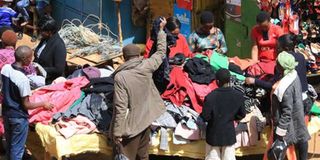Traders ask State to lift ban on used clothes imports

Second-hand clothes are hawked at a market in Nyeri Town on August 13, 2017. Importation of these clothes has been proscribed. FILE PHOTO | NATION MEDIA GROUP
What you need to know:
- The clothes are popular with a large section of Kenyans as the country’s textile industry cannot supply all with affordable clothes.
The decision by the government to ban the importation of second-hand clothes in the wake of the Covid-19 pandemic has thrown businesses into another crisis.
Traders accuse the government of destroying their livelihoods through unilateral decisions.
The traders say five million Kenyans are directly involved in the mitumba business while double that number earn from it indirectly.
Gikomba market in Nairobi is usually the first point of call for imported used clothes, which are then distributed to other towns.
The clothes are popular with a large section of Kenyans as the country’s textile industry cannot supply all with affordable clothes.
FINANCIAL BURDEN
The traders say those whose consignments are abroad will suffer huge financial losses. But even with the growing protests, the government says there is no turning back.
The Kenya Bureau of Standards (Kebs) put a notice of the ban in the national dailies on Tuesday, a week after Industrialisation Cabinet Secretary Betty Maina gave a hint.
“As a precautionary measure, Kebs wishes to notify the public... that the importation of used garments and footwear is prohibited until further notice. This is pursuant to the declaration of Covid-19, a global pandemic and in line with the requirements of the applicable standards and the codes of practice for inspection,” the notice signed by Managing Director Bernard Njiraini read.
Ms Maina said the decision was made on health grounds. “Coronavirus has given us an opportunity for homegrown solutions. When such a thing happens again, we should not be exposed,” the minister said.
SAFETY MEASURES
National Assembly Committee on Trade, Industry and Cooperatives chairman Kanini Kega said the ban should not be immediate and drastic.
“No goods will be denied entry if they had been loaded before the decree was issued,” the Kieni MP said.
Mitumba Association of Kenya chairperson Teresiah Njenga read malice in the ban. She said it takes three months to order and for the goods to arrive at Mombasa port.
Ms Njenga said a consignment is usually given a certificate of public health and one for fumigation, “and these are done with full participation of officials in the originating country and those from Kenya”.
The same consignment is then issued a certificate of conformity. She said the World Health Organisation (WHO) has not said the virus can remain alive in a bale for three months, the time it takes to import the clothes. “The government is banning mitumba yet the Export Processing Zone factories are allowed to bring in raw materials. The EPZs are owned by less than 100 individuals who employ 100,000 people,” she said.
“And they don’t even pay import duty. This decision obviously has nothing to do with coronavirus.”
TEXTILE INDUSTRY
She added that businesspeople should be given an a longer period to invest in the textile industry.
“The likelihood of an infected person contaminating commercial goods and the risk of getting coronavirus from a package that has been moved, and exposed to different conditions are low,” WHO said in a statement.
After many pleas from players in the mitumba industry, the government on Thursday allowed the imports, but only those that had been ordered until March 12.
“This is a new disease and we will not go rescind the directive. One cannot tell if the clothes were worn by Covid-19 patients. We will only allow in consignments that were inspected before the pandemic,” Mr Njiraini said.
Ms Maina hinted at the ban when she received a proposal from private firms on reviving the small and medium enterprise vibrancy.
According to a report on clothing value chain, the government should boost the production of garment by giving makers incentives.
In the first nine months of 2019, businesses used Sh17.8 billion to import used clothes and shoes, a rise of 6.88 per cent or Sh1.14 billion compared to a similar period the previous year.





